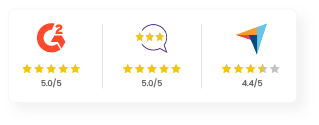A Complete Guide
Key Benefits of Using LXP for DEI Initiatives
Key Benefits of Using LXP for DEI Initiatives
In the last few years, most CHROs and companies have greatly increased their commitment to DEI. Unfortunately, however, there has also been a rise in employee pushback to these efforts. A Gartner survey of DEI leaders revealed that one of their biggest challenges (cited by 23%) is managing employee resistance to DEI-driven changes. Resistance can stem from various factors, including scepticism about the effectiveness of DEI programs, discomfort with the topics being addressed, or perceptions of forced compliance.
Creating engaging and interactive training programs is the key to reducing this pushback. By delivering DEI content in a personalized, relatable, and immersive way, CHROs can get greater employee understanding, buy-in, and even active participation. All this can be best achieved with the help of an LXP for DEI and compliance.
LXPs are designed to offer personalized, dynamic, and interactive learning experiences that are both engaging and effective.
Let’s see how:
1. Personalized Learning Experiences
An LXP tailors content to individual needs which results in more inclusivity across diverse employee groups. For instance, a global workforce can access DEI training in multiple languages and cultural contexts which creates a sense of belonging in them.
Personalization goes beyond simple translations. It takes into account the unique cultural perspectives, experiences, and challenges that each employee may face within the organization. An employee based in a multicultural office in Asia may face different workplace dynamics than an employee working in Europe or North America. By personalizing the training to reflect their respective cultural realities, an LXP ensures that the content is relevant, relatable, and impactful.
Personalization through LXP also leverages AI to analyze learners’ profiles, their learning styles, past behaviors, and performance to create a learning path that resonates with their needs. This means that DEI content is not just a one-size-fits-all approach. Instead it’s tailored to ensure employees are not overwhelmed or under-challenged which leads to better engagement and retention of knowledge.
Another key benefit of personalized learning experiences is the ability to target different employee roles. For instance, frontline employees may need training that emphasizes daily interactions and behavioral changes, whereas senior leadership might benefit from content focused on organizational culture change and inclusive leadership practices. By offering these tailored learning paths, an LXP helps CHROs ensure that the right DEI messages reach the right individuals.
2. Engagement-Driven Tools
Interactive elements like gamification, AI-powered simulations and peer-to-peer learning through an employee engagement LXP can make training engaging and memorable. This helps employees internalize key concepts and apply them in real-world scenarios.
Employees are often more engaged when they can participate in interactive experiences rather than passively consume content. Role-playing scenarios or quizzes can be used to simulate difficult DEI-related situations, such as addressing microaggressions or navigating conversations about privilege and bias. By actively participating in these simulations, employees gain first-hand experience in applying the DEI principles they have learned.
AI-powered simulations can take this engagement even further by adapting to each learner’s unique style and pace. For example, an employee who struggles to grasp the concept of unconscious bias may benefit from an interactive simulation where they experience how biased decisions are made in a simulated workplace. These tailored simulations provide a safe and immersive environment where employees can practice inclusive behaviors without real-world consequences, reinforcing the importance of DEI concepts in a practical context.
Additionally, peer-to-peer learning leads to a sense of community and shared learning. This can be accomplished through discussion boards, collaborative projects, or social learning tools built into the LXP. Employees from different teams or departments can share insights, ask questions, and offer advice, promoting deeper understanding through dialogue. Peer learning also supports diverse perspectives, as individuals from different backgrounds and roles can contribute their unique viewpoints.
Finally, engagement tools like badges, rewards, and leaderboards can motivate employees to complete training modules, encouraging friendly competition and providing recognition for progress in DEI initiatives. These gamified elements incentivize participation, making learning feel less like a mandate and more like a rewarding experience.
3. Compliance and Metrics
A compliance training LXP excels in tracking progress and ensuring adherence to compliance requirements. Advanced analytics allow CHROs to measure the impact of DEI initiatives, identify gaps, and refine strategies as needed. DEI compliance is crucial to ensuring that training not only fulfills regulatory requirements but also leads to measurable behavior change within the organization.
An LXP is also equipped with robust tracking capabilities that provide real-time data on employee progress. This means that HR and L&D teams can monitor how employees are engaging with the content, how much time they spend on each module, and whether they are completing the training on schedule. Now, if a large segment of employees fails to complete a module on inclusive leadership, it is a signal that there’s a need to reframe the content or provide additional support.
Moreover, an LXP allows HR teams to dig deeper into analytics and track the effectiveness of different DEI programs. Using advanced analytics, HR teams can gain insights into how DEI training is impacting key performance indicators (KPIs) such as employee satisfaction, retention, and engagement. These insights help them make data-driven decisions about the future direction of DEI training and identify areas that require improvement.
Beyond completion rates, LXPs can also assess behavioral change by providing employees with opportunities to apply what they have learned. For instance, a scenario-based simulation might track how employees respond to difficult situations which can offer HR managers insights into how well employees have internalized the DEI training. By collecting data on both the completion of training and its real-world application, an LXP gives a holistic view of DEI training’s impact.
4. Scalable and Continuous Learning
An often-overlooked benefit of an LXP is its ability to scale DEI training across large organizations. Whether an organization has a small team or thousands of employees across different regions, an LXP can deliver consistent and high-quality DEI content to every employee. As a result, scaling DEI initiatives has never been easier.
LXP also enables continuous learning, which is essential for driving long-term change. DEI is not a one-time training event but an ongoing commitment to evolving company culture. An LXP helps continuous learning by offering refreshers, new modules, and ongoing resources to ensure DEI principles are consistently reinforced. For instance, after completing the initial DEI training, employees may receive quarterly updates on new DEI policies, best practices, or case studies. This ensures that the organization stays current with evolving DEI standards and that employees’ knowledge remains fresh and relevant.
5. Encouraging Accountability
Finally, an LXP provides a platform for organizations to encourage accountability around DEI initiatives. With features like progress tracking and reporting dashboards, CHROs and other HR leaders can hold themselves and their teams accountable for meeting DEI goals.
Employees can also be encouraged to take responsibility for their own learning journey. By promoting self-directed learning, an LXP empowers individuals to take ownership of their DEI education and foster a culture of inclusivity within the organization.
By offering these benefits, an LXP empowers CHROs and HR leaders to create impactful and sustainable DEI programs.






